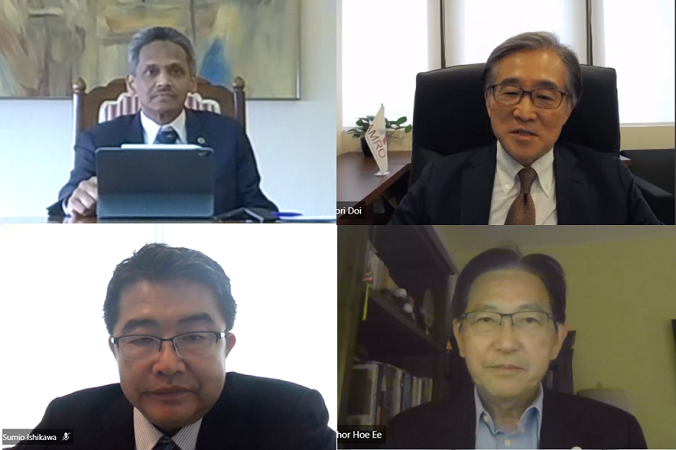
From top left-hand corner, clockwise: Bank Negara Malaysia Deputy Governor Mr. Abdul Rasheed bin Abdul Ghaffour, AMRO Director Mr. Toshinori Doi, AMRO Chief Economist Dr. Hoe Ee Khor, AMRO Lead Economist Dr. Sumio Ishikawa
SINGAPORE, December 9, 2020 – The Malaysian economy is undergoing a strong but uneven recovery following the nationwide lockdown in March and April. The ongoing resurgence of COVID‑19 infections has weakened the recovery momentum heading into the final quarter of 2020. However, proactive and calibrated policies are helping to protect the welfare of vulnerable groups and revitalize the economy. This is according to the preliminary assessment by the ASEAN+3 Macroeconomic Research Office (AMRO) after its virtual Annual Consultation with the Malaysian authorities from November 16 to December 4, 2020.
The AMRO team was led by Lead Economist, Dr. Sumio Ishikawa. AMRO Director, Mr. Toshinori Doi, and Chief Economist, Dr. Hoe Ee Khor, participated in the policy meetings. The discussions focused on Malaysia’s response to the ongoing health and economic crisis, and the policy considerations necessary to forge a lasting recovery going forward.
Economic outlook
“We expect the Malaysian economy to contract by 5.5 percent in 2020, and to recover strongly by 7.0 percent next year,” said Dr. Ishikawa. “Looking ahead, Malaysia is in a strong position to ride a vaccine-led global economic recovery, given ample domestic savings, a diversified economy, and resilient banking system.”
Following a sharp contraction in the second quarter, the economy rebounded strongly in the third quarter as production caught up with backlogs and pent-up demand. Notwithstanding mobility restrictions heading into the final quarter, households and businesses remain supportive of economic activity.
Policy responses and considerations
The recently passed 2021 Budget extends the economic stimulus measures into 2021, in a bid to strengthen the recovery and lay the foundations for a resilient economy.
The Budget makes provision for continued cash transfers to lower‑income groups, tax reliefs, and job retention and hiring incentives schemes, while enhancing healthcare services, including the procurement of COVID-19 vaccines. These measures are complemented by a slew of off-budget initiatives, which include targeted loan repayment assistance schemes, reduced pension contributions, and limited withdrawals, and concessionary credit facilities to small and medium-sized enterprises.
Proactive and concerted efforts to encourage domestic and foreign investments are welcome, as they would contribute toward a more productive and diversified economy emerging out of the pandemic. These include ramping up investments in transport infrastructure and broadband services, and the roll-out of investment incentives in high-value manufacturing and service activities. Such initiatives are complemented by grants to upskill labor and increased spending in the education sector.
At the same time, the aggressive loosening of monetary conditions has been crucial in maintaining orderly financing conditions. Unless the recovery falters, it would be prudent to maintain the current policy rate of 1.75 percent, which is already at a record low.
Malaysia’s external position remains strong, supported by the continued surplus in the current account and buoyant foreign direct investment inflows. The resumption of foreign capital inflows since the US dollar funding stress in March, particularly to the debt market from May through October, have reinforced Bank Negara Malaysia’s reserves buffer and the overall external position.
Adjustments to the foreign exchange policy in late 2016 have contributed to lower capital flow volatility during the recent stress episode. In particular, the tightened enforcement against offshore ringgit trading and development of the onshore hedging market have led to capital inflows which are more stable and less speculative in nature. AMRO is encouraged by the recent enhancements to the scheme—the flexibility extended to index‑tracking non-resident investors to trade foreign exchange forwards without an underlying investment, albeit on a limited basis, as well as ringgit‑denominated non-deliverable interest rate swaps (NDIRS) with onshore banks. Sustaining efforts to improve the trading flexibility of participants should support the deepening of the onshore hedging market and enhance the flexibility of the ringgit exchange rate.
With ample liquidity and capital buffers, the banking system is in a strong position to manage increased credit risks and facilitate the continued flow of credit to the economy. However, the economic outlook and the extent of loan impairments remain uncertain. Against this backdrop, increasing the frequency of liquidity and credit stress-testing exercises of the financial institutions is strongly encouraged to identify risk points early on. Regulators should also closely monitor domestic banks’ overseas operations to mitigate the risk of contagion.
The rising debt burden, as a result of the sizeable fiscal stimulus, underscores the importance to restore fiscal buffers over the medium term. The country’s fiscal deficit is targeted to decline from 6.0 percent of GDP in 2020 to about 4.0 percent by 2023, facilitated by a gradual exit from the stimulus measures and by enhancing fiscal revenue. Reforms to broaden the tax base would be necessary to lower the deficit and guide the government debt back to the pre‑pandemic statutory limit of 55 percent of GDP by 2023. Consideration should be given to the re-instatement of the goods and services tax, perhaps at an initial rate of less than 6 percent, in 2022.
Looking ahead, sustaining the policy momentum to safeguard people’s welfare and revitalize the economy, raise productivity, and restore fiscal buffers would support a dynamic and inclusive economy in the post-pandemic new normal. Further complementing the sound macroeconomic policies with a broad-based sustainability agenda would enhance economic resilience as Malaysia advances from an upper middle‑income to a high-income nation.
The AMRO team would like to thank the Malaysian authorities and other counterparts for their valuable insights and the candid exchange of views. This year’s consultation had to be conducted virtually due to the ongoing pandemic. And AMRO wishes to express its appreciation for the support and accommodation that have made this consultation possible.
